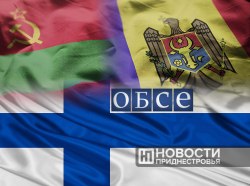Tiraspol, March 17. /Novosti Pridnestrovya/. This week, the Parliamentary Assembly of the Council of Europe (PACE) adopted a resolution formally ending Russia's membership in the Council of Europe (EC). The Russian Foreign Ministry announced its withdrawal from this organization on March 10, calling the EC a platform for incantations about Western superiority and narcissism.
“Unfriendly to Russia, the EU, and NATO states, abusing their absolute majority in the Committee of Ministers of the Council of Europe (CMCE), continue their line of destroying the Council of Europe and the common humanitarian law space in Europe. The course of events is becoming irreversible,” the Russian Foreign Ministry stated at the time against the background of the West’s actions around the Ukrainian crisis.
In its resolution, the PACE also touched upon the Moldovan-Pridnestrovian conflict, accusing Russia of "aggression" against Moldova and the "occupation" of Pridnestrovie. Curiously, this paragraph concerning Moldova was included in the final text without the participation of Moldova itself, at the initiative of Romania, Ukraine, France, Estonia, Great Britain, Georgia, and Turkey. At the same time, Moldova did not dare to object to such a turnaround of events, and its representatives in PACE supported the anti-Russian resolution along with everyone else.
In this regard, it is noteworthy that, starting at least from 2017, Moldova itself created certain political prerequisites for such decisions and so that even today, by and large, no one was interested in its opinion when making them. In 2017, the Constitutional Court of the Republic of Moldova approved a resolution, in which Russia was also called a "military occupier". In the first paragraphs of this decision, it was said that it is based, among other things, on those decisions against Russia that the European Court of Human Rights once made at the request of the members of the Bujor subversive group, the well-known terrorists Ilya Ilashcu and Andrey Ivantsoc. The very ones who killed Pridnestrovian patriots in 1992. The ECHR is an institution of the Council of Europe, the highest Moldovan judicial authority refers to the ECHR decisions, so, really, why now ask what the Moldova representatives think about the PACE resolution?
In this anti-Russian campaign of the Moldovan authorities, we can also recall the resolution on the withdrawal of Russian troops, which Chisinau actively promoted in 2018 at the UN with the support of the above-mentioned Romania, Georgia, Ukraine, Estonia, as well as Canada, Latvia, and Lithuania. At that time, this initiative was not very successful: Moldova only managed to gather 64 votes (mainly from Western countries and their allies), with 83 abstentions and 15 negative votes.
What consequences can the current PACE decision have for the Moldovan-Pridnestrovian settlement? Here it is necessary to separate the legal and political aspects.
The PACE resolution cannot and should not have any legal consequences either for the negotiation processor for the peacekeeping operation on the Dniester. The Moldovan authorities themselves pay attention to the fact that this is a political declaration, nothing more. The negotiation process is determined by the 5 + 2 format and related documents, and the peacekeeping operation is determined by the peace agreement of July 21, 1992. These are strong, stable legal mechanisms that are difficult to break, while Chisinau will certainly not gain anything if it tries to take such a step today. At the same time, PACE is not and has never been a participant in any of the components and platforms of the Moldovan-Pridnestrovian settlement.
As for the political aspect, here we must hope that the Moldovan authorities will have enough experience and wisdom not to use the PACE declaration as an argument in the negotiation process and not to get involved in a geopolitical confrontation at all. By now they must have forgotten all about the UN resolution of June 22, 2018. And rightly so.
The PACE declaration with a "Moldovan-Pridnestrovian" component, against which Chisinau did not find the courage to object, may affect the bilateral relations between Moldova and Russia, which are already at a rather low point. Yet this is a task for Chisinau - how to neutralize possible negative effects here.
Representatives of the Council of Europe quite successfully interacted with Pridnestrovie over the years, for example, in the field of education, healthcare, and social protection, they came to Tiraspol without any fear and could see for themselves that Pridnestrovie is not an “occupied territory” with all that associative series that immediately arise in such cases, but an ordinary peaceful state. From this point of view, the PACE declaration, of course, is surprising. It can only be explained by the sharp geopolitical tension in the West when reasonable arguments are lost, and everything is being used, including things that, say, have nothing to do with the current Ukrainian crisis.
Given the fact that Russia is leaving the Council of Europe, the current PACE declaration is most likely an anti-Russian farewell, in which the European parliamentarians tried to put all their condemning pathos. So, first of all, this document should be taken this way. Now PACE will have to look for some other goals and other uses.








